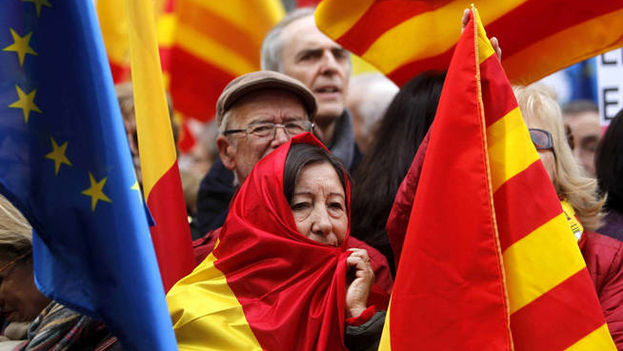
14ymedio, Miami, Carlos Alberto Montaner, 17 December 2017 — On Dec. 21, the residents of Catalonia will vote again. Few international news have generated so much interest among Latin Americans as those emerging from Spain. I don’t say “the Catalans” because (as it should be) all the Spanish citizens living in the four Catalonian provinces — Barcelona, Lérida, Gerona and Tarragona — have been summoned to the polls. And I’m talking about a territory of 32,000 km2 similar to that of Belgium, with a population of 7.5 million similar to that of Israel and a First-World GNP measured in a purchasing power of 43,000 dollars, approximately like Canada’s.
My interest in this subject transcends journalism. In addition to having spent the best 40 years of my life in Madrid, I aver that a substantial part of my family comes from the Leridan Pyrenees, including Andorra or Lloret de Mar (Gerona). Four sisters of my maternal grandfather inaugurated genital nationalism in Havana. They remained spinsters in Cuba, lamenting (in Catalan) that they couldn’t find Catalonian men to marry, even though they made periodic trips to Barcelona for the purpose of kidnapping them and taking them back to the island. They failed. They died virgins and martyrs (I believe) many decades ago.
The surveys show pro-Spain voters in a slight majority, generally contented with liberal democracy (which, I admit, pleases me) dispersed in a broad framework that ranges from the conservative right of the Popular Party to the leftist Socialist Workers Party of Spain, which occasionally is vegetarian and social-democratic, although sometimes it experiences carnivore spasms and bites in radical hunger. Add to this the liberal center of Ciudadanos (Citizens), the group that might earn the most votes, which in no way guarantees that it will be able to form a government. The right is inconvenienced by its existence and the left detests it.
Although the purpose of the elections is to give a legitimate government to a region whose bosses have been ousted for violating the existing legality, Tyrians and Trojans (though they will not officially admit it) will interpret the outcome as if it were a nonbinding plebiscite on independence and we’ll go back to the starting point. Childish though it may seem, there is no emotion more powerful and tenacious than nationalism. Trying to decapitate it is futile; it always reappears. So, the wisest course is to learn to coexist with the phenomenon and keep the blood from spilling into the river.
That is why I believe the reasonable thing to do is to open a Constitutional door to the pro-sovereignty crowd so they can leave, if they ever manage to permanently build a majority decisive enough to achieve their separatist objective.
I see Catalonia as part of an unequal Spain, created in olden days with different contributions, so I’d love to see it remain inside the common nation, but — because it’s a sentimental, not a legal issue — the most important factor is how the Catalans see themselves, not how we see them from the outside.
It’s like a divorce. It took the Spaniards (and some Latin Americans) far too long to admit that the decision to remain together belongs to the married couple, not the family. Any region of Spain should be given the chance to separate from the whole of the government to which it belongs. (Five regions are essentially differentiated: Catalonia, the Basque provinces, Galicia, the Canary Islands and the vast Spanish zone that includes the rest of the country.) Most likely, that “open door,” far from exacerbating the recurring calls for independence, will tone them down.
Because I know the history of Cuba, I know that Spain’s refusal to replicate the relaxed relationship between the United Kingdom and Canada sparked the final and definitive War of Independence. Perhaps a larger dose of self-government for Cuba might have prevented the war, the sinking of the U.S.S. Maine and the disaster of 1898.
Cuba — especially Havana — was and felt reasonably Spanish, but the politicians in Madrid made that relationship impossible, perhaps because of the uncontrollable turbulence of a nation that in a few years went through the trauma of the end of the Bourbon dynasty, the enthronement of a luckless Italian prince, the chaos of the First Republic, and the shady deals of the Restoration. There wasn’t enough tranquillity to act wisely.
Of course, the secession of any Spanish region would have to be a rational and consensual decision within a law that took into account a measure that would affect future generations. That would require a pro-independence majority of 60 percent, the approval in two consecutive plebiscites held during two separate legislative sessions to prevent conjuctural and insufficiently pondered reactions, and the economic consequences of any rupture, which must be previously analyzed. The parties must determine how the common goods will be divided and who will pay for the onerous cost of separation. Exactly the same as happens in any civilized divorce.
_______________________
The 14ymedio team is committed to serious journalism that reflects the reality of deep Cuba. Thank you for joining us on this long road. We invite you to continue supporting us, but this time by becoming a member of 14ymedio. Together we can continue to transform journalism in Cuba.
